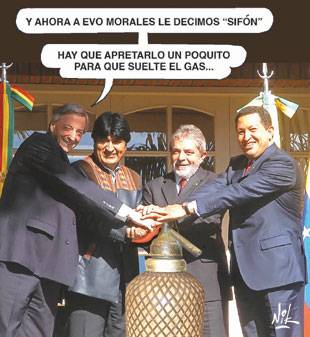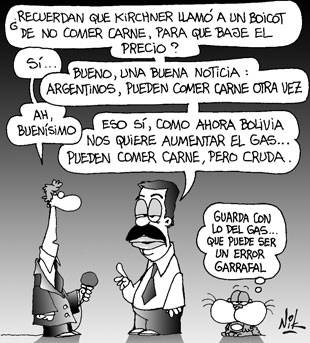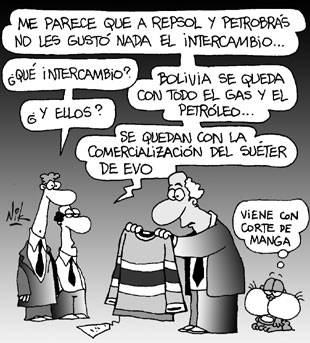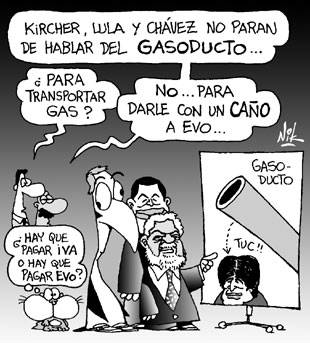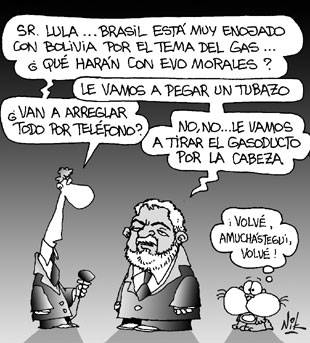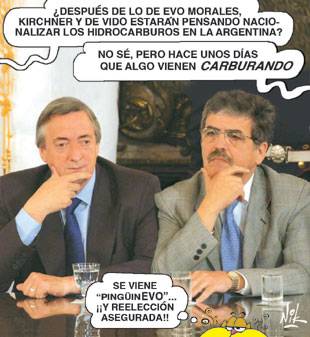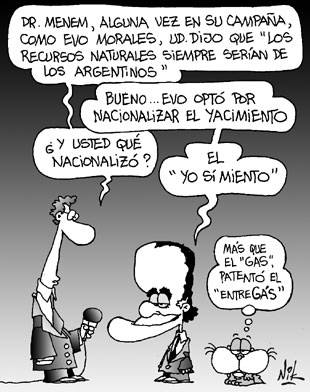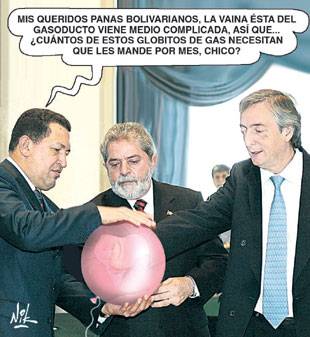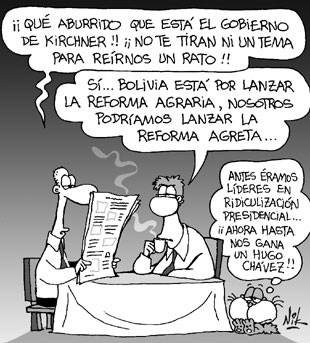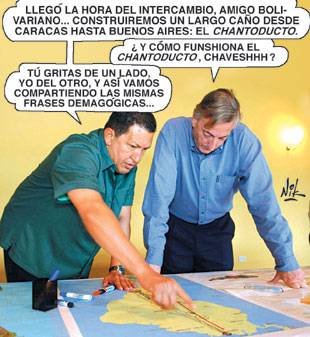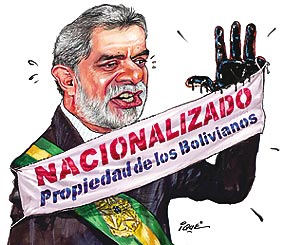Publicado en NYTimes.
By REUTERS
Published: May 8, 2006
WASHINGTON (Reuters) - By nationalizing Bolivia's energy industry, President Evo Morales lived up to a pledge to be Washington's nightmare and highlighted waning U.S. influence in Latin America.
Last week's action from the leftist, whose allies are U.S. adversaries Venezuelan President Hugo Chavez and Cuban leader Fidel Castro, was another step in the region's retreat from U.S.-prescribed free-market economics.
And the United States can do little to stem a tide of Latin American voters turning to leftists like Morales who rail at free trade and foreign investment for failing to improve the lives of the region's impoverished majority.
``It is a genie that is not going to be put back in the bottle,'' said Peter Hakim, head of the Inter-American Dialogue, a Washington-based think tank.
It was Brazil, Argentina and Venezuela that held an emergency summit with Morales to manage the aftershocks from his decision to send troops to gas fields, alarming investors, rattling markets and angering foreign governments.
The U.S. public response to the nationalization was merely for spokesmen to cautiously express concern over the potential economic impact.
That belied the importance for Washington of Morales' decree to take over the oil and gas industries, giving government energy company YPFB control over production and the state a 51-percent stake in several foreign companies.
``The socialism championed by him and Chavez is an increasing threat to the United States and its economic model that has dominated for decades. That's what's at stake here,'' said Larry Birns of the Council on Hemispheric Affairs think tank.
``But with the U.S. under-reaction, you'd think the United States is condemned to be an observer,'' he said.
``GO ITS OWN WAY''
Unable to forge region-wide support for its policies, the superpower and region's traditional patron will have to depend more and more on bilateral cooperation, such as the free-trade deals it has been hammering out in recent years, analysts say.
``U.S. influence in the region now has to be on a country-by-country, issue-by-issue basis,'' Hakim said.
That is a stark contrast from the United States that launched the Summit of the Americas in 1994 to spread its free-trade agenda, hoping for an accord for the whole hemisphere.
Latin America will keep trading with its closest economic partner but it will seek increasing independence from the United States by deepening its relations with Europe, China and countries across the developing world, according to Birns.
``Latin America will go its own way,'' he said.
After the September 11 attacks, President George W. Bush turned his focus to fighting terrorism in the Islamic world -- and away from Latin America, which he had vowed to make a priority of his presidency.
That neglect meant last year -- for the first time -- the U.S.-backed candidate failed to win selection as head of the Organization of American States, the hemisphere's top diplomatic body.
Some Bush supporters want a renewed focus on the region to counter the anti-American sentiment fueled by leftists like Morales, who vowed to be a U.S. nightmare in his election campaign last year.
``Sad to say, it may already be too late for the Bush administration to garner favorable public support from South and Central Americans,'' Andy Messing of the National Defense Council Foundation wrote in the Washington Times newspaper.
``But laying the groundwork now could be a necessary and worthy effort to be carried over to future administrations,'' he added.
By REUTERS
Published: May 8, 2006
WASHINGTON (Reuters) - By nationalizing Bolivia's energy industry, President Evo Morales lived up to a pledge to be Washington's nightmare and highlighted waning U.S. influence in Latin America.
Last week's action from the leftist, whose allies are U.S. adversaries Venezuelan President Hugo Chavez and Cuban leader Fidel Castro, was another step in the region's retreat from U.S.-prescribed free-market economics.
And the United States can do little to stem a tide of Latin American voters turning to leftists like Morales who rail at free trade and foreign investment for failing to improve the lives of the region's impoverished majority.
``It is a genie that is not going to be put back in the bottle,'' said Peter Hakim, head of the Inter-American Dialogue, a Washington-based think tank.
It was Brazil, Argentina and Venezuela that held an emergency summit with Morales to manage the aftershocks from his decision to send troops to gas fields, alarming investors, rattling markets and angering foreign governments.
The U.S. public response to the nationalization was merely for spokesmen to cautiously express concern over the potential economic impact.
That belied the importance for Washington of Morales' decree to take over the oil and gas industries, giving government energy company YPFB control over production and the state a 51-percent stake in several foreign companies.
``The socialism championed by him and Chavez is an increasing threat to the United States and its economic model that has dominated for decades. That's what's at stake here,'' said Larry Birns of the Council on Hemispheric Affairs think tank.
``But with the U.S. under-reaction, you'd think the United States is condemned to be an observer,'' he said.
``GO ITS OWN WAY''
Unable to forge region-wide support for its policies, the superpower and region's traditional patron will have to depend more and more on bilateral cooperation, such as the free-trade deals it has been hammering out in recent years, analysts say.
``U.S. influence in the region now has to be on a country-by-country, issue-by-issue basis,'' Hakim said.
That is a stark contrast from the United States that launched the Summit of the Americas in 1994 to spread its free-trade agenda, hoping for an accord for the whole hemisphere.
Latin America will keep trading with its closest economic partner but it will seek increasing independence from the United States by deepening its relations with Europe, China and countries across the developing world, according to Birns.
``Latin America will go its own way,'' he said.
After the September 11 attacks, President George W. Bush turned his focus to fighting terrorism in the Islamic world -- and away from Latin America, which he had vowed to make a priority of his presidency.
That neglect meant last year -- for the first time -- the U.S.-backed candidate failed to win selection as head of the Organization of American States, the hemisphere's top diplomatic body.
Some Bush supporters want a renewed focus on the region to counter the anti-American sentiment fueled by leftists like Morales, who vowed to be a U.S. nightmare in his election campaign last year.
``Sad to say, it may already be too late for the Bush administration to garner favorable public support from South and Central Americans,'' Andy Messing of the National Defense Council Foundation wrote in the Washington Times newspaper.
``But laying the groundwork now could be a necessary and worthy effort to be carried over to future administrations,'' he added.


